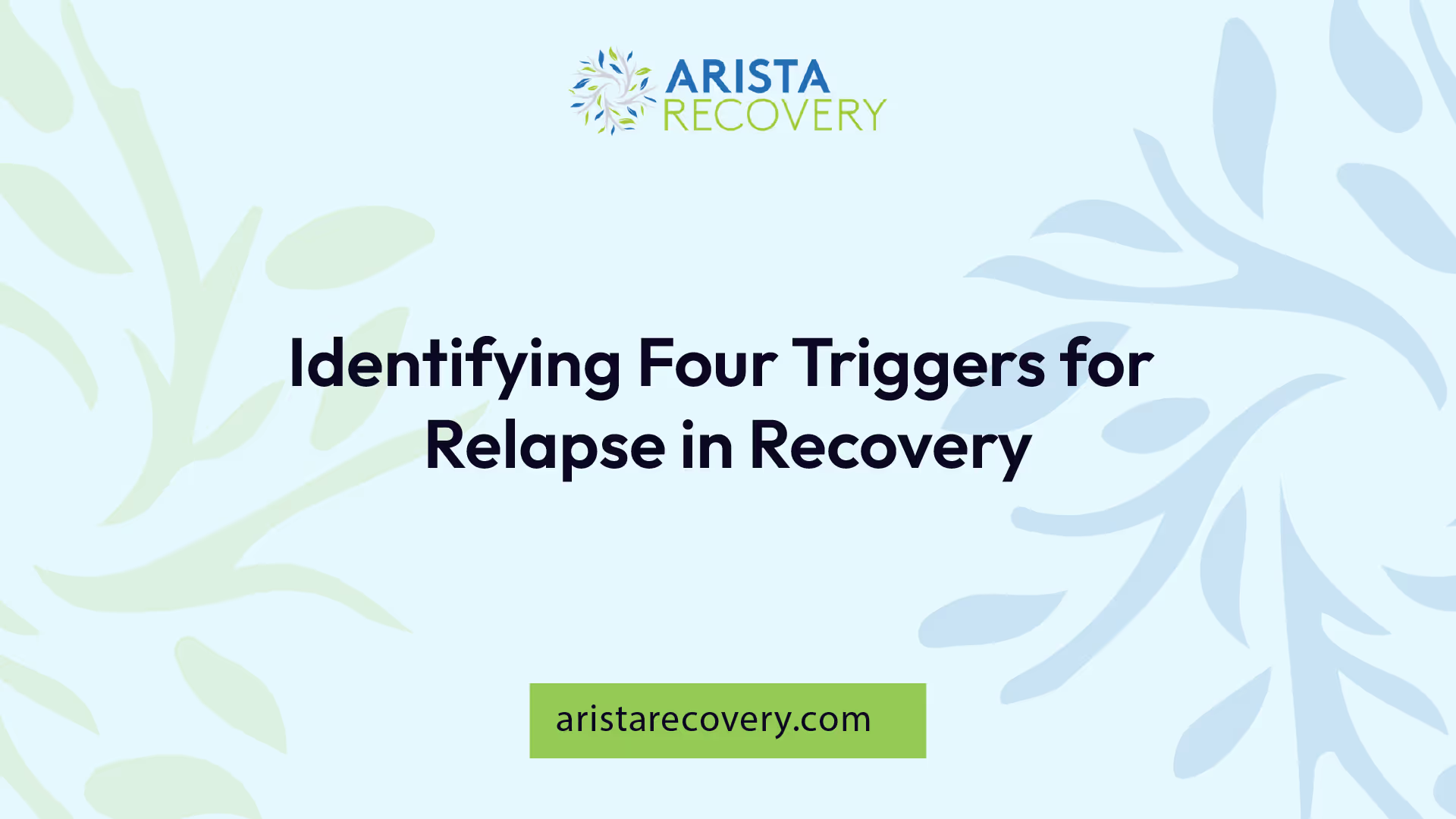Identifying Four Triggers for Relapse in Recovery

Understanding Relapse Triggers
Overview of Relapse in Recovery
Relapse is a common challenge faced by individuals in recovery from addiction. It refers to a return to substance use after a period of sobriety. Understanding the triggers that lead to relapse is crucial for maintaining long-term recovery. By identifying these triggers, individuals can develop strategies to mitigate the risk of returning to old habits.

Four Main Triggers for Relapse
Research indicates that there are four major triggers for relapse in recovery: re-exposure, emotional stress, mental health issues, and failure to build a support system [1]. Each of these triggers can significantly impact an individual's journey toward sobriety.
TriggerDescriptionRe-exposureEncountering environments, people, or situations associated with past substance use can provoke cravings and hinder recovery efforts.Emotional StressExperiencing intense emotions such as sadness, guilt, or anger can lead individuals to seek substances as a coping mechanism. (Free by the Sea)Mental Health IssuesPre-existing or emerging mental health disorders can complicate recovery and increase the likelihood of relapse.Failure to Build a Support SystemLacking a robust network of support from peers and professionals can leave individuals feeling isolated and more vulnerable to relapse.
To strengthen their recovery, individuals should also be aware of the HALT acronym (Hungry, Angry, Lonely, Tired) which identifies conditions that heighten the risk of relapse. Managing these states through self-care is essential [2].
Recognizing these triggers can empower individuals to proactively address potential pitfalls in their recovery process. For more information on maintaining sobriety, consider reading about rebounding from addiction relapse or the difference between slip and relapse.
Impact of Stress on Relapse
Understanding the connection between stress and relapse is vital for maintaining long-term recovery from addiction. Stress can serve as a significant trigger that may lead individuals back to substance use.
Recognizing and Managing Stress in Recovery
Recognizing and managing stress effectively is crucial in recovery. Stress often manifests in various forms and can be challenging to measure. Research from the National Library of Medicine (NLM) indicates that stress can be experienced on multiple levels simultaneously. This makes it particularly important for individuals in recovery to be aware of their stressors and the feelings accompanying them.
An effective approach to managing stress includes employing techniques to help with awareness and acknowledgment. Identifying what is troubling a person is the first vital step towards alleviating stress and improving mental well-being. Self-care strategies, such as following the HALT acronym (Hungry, Angry, Lonely, Tired), can help individuals maintain a balanced state. Addressing these high-risk conditions is essential for preventing relapse.
Stress FactorDescriptionHungryEnsuring proper nutrition can prevent irritability and anxiety.AngryPracticing anger management techniques can reduce aggressive impulses.LonelySeeking social support helps combat feelings of loneliness.TiredPrioritizing rest can improve emotional regulation.
The Role of Stress in Relapse
Stress greatly influences the likelihood of relapse for individuals recovering from addiction. Chronic stress can lead to neuroadaptive changes within stress and reward pathways, particularly for those with a history of alcohol dependency. Such alterations can change a person's emotional responses and motivation, thereby increasing relapse risk. Stress-related mechanisms play a significant role in cravings for alcohol and overall susceptibility to relapse among those with alcohol use disorders.
It is essential for individuals in recovery to develop healthy coping strategies. This can involve relaxation techniques, such as mindfulness, meditation, or physical exercise, which can help to manage stress levels effectively. Individuals can further reinforce their recovery by creating supportive environments and engaging in community support groups.
For additional insights into preventing relapse and its triggers, refer to articles on four important things about relapse and rebounding from addiction relapse. Recognizing stress and its impact can empower individuals in recovery to stay on their journey and lead healthier lives.
Importance of Social Support
Social support plays a vital role in recovery, especially for individuals grappling with substance use disorders (SUDs). Building and maintaining a healthy support network can significantly influence recovery outcomes and help prevent relapse.
Building a Healthy Support System
Individuals with a substance use disorder often lack the same resources and support networks compared to those without SUDs. Research shows that positive relationships with caring family, partners, and friends can aid in abstaining from substances and maintaining sobriety after a diagnosis of SUD NCBI. A healthy support system enables individuals in recovery to:
To cultivate a strong social support system, individuals can:
Peer and Professional Support in Recovery
Both peer support and professional relationships are crucial in recovery. Recognition by a peer or a caring relationship with a service provider can significantly aid individuals in initiating and maintaining abstinence. Engaging self-agency helps protect against negative influences during recovery NCBI.
The presence of social support has been shown to improve treatment outcomes. Conversely, factors like marital distress, spousal criticism, and lack of emotional support can lead to worse treatment outcomes and increase the risk of relapse NCBI.
Creating a strong, supportive environment not only fosters positive relationships but also enhances self-esteem and communication skills, making it easier for individuals to navigate the challenges of recovery. For more insights on overcoming challenges in recovery, explore our article on rebounding from addiction relapse.
Environmental Cues and Relapse
Understanding the impact of environmental cues is crucial in recognizing potential triggers for relapse in recovery. These cues can play a significant role in the process of addiction, as they activate areas of the brain involved in memory processing, which can make resisting the urge to use difficult.
Environmental Triggers for Relapse
Environmental triggers are stimuli in an individual's surroundings that can provoke memories associated with drug use. According to research from the University of Guelph, these cues can enhance cognitive effects that may complicate recovery efforts [3]. For instance, individuals may experience cravings when they encounter places, objects, or people linked to their past substance use.
Some common environmental triggers include:
Trigger TypeDescriptionLocationsBars, parties, or any places where substance use occurred.PeopleFriends or acquaintances who still engage in substance use.ObjectsParaphernalia or items associated with drug use, such as pipes or bottles.SituationsHigh-stress scenarios that might provoke a desire to use.Smells and SoundsScents or music that remind the individual of past experiences.
Understanding these triggers can empower individuals in recovery to develop strategies to manage their responses effectively.
Strategies to Combat Environmental Cues
To navigate the challenges presented by environmental cues, various strategies can be employed. These strategies focus on enhancing coping mechanisms and minimizing exposure to triggers.
For more on recognizing signs of potential relapse, visit our article on five signs an addict is about to relapse and learn how to effectively navigate recovery hurdles. Additionally, understanding the difference between slip and relapse can further aid in developing a robust relapse prevention plan.
Emotional Factors in Relapse
Emotional factors play a significant role in the potential for relapse during recovery from addiction. Managing negative emotions and regulating feelings is essential for long-term sobriety.
Managing Negative Emotions
Individuals in recovery often encounter negative emotions such as sadness, guilt, shame, anger, and loneliness. Learning to cope with these feelings without resorting to substance use is crucial for sustaining sobriety [2].
The following table outlines common negative emotions and healthy coping strategies to manage them:
Negative EmotionHealthy Coping StrategiesSadnessJournaling, talking to a friend, engaging in hobbiesGuiltPracticing self-forgiveness, seeking therapyShameBuilding self-esteem, participating in support groupsAngerPhysical activity, practicing mindfulnessLonelinessConnecting with supportive peers, attending social events
Developing coping strategies can help individuals navigate these emotions and reduce the likelihood of relapse.
Emotional Regulation in Recovery
Emotional regulation refers to the ability to manage and respond to one's emotional experiences in a healthy way. Poor emotional regulation can lead to increased cravings and a higher risk of relapse. Studies show that significant numbers of individuals—between 50% and 70%—struggle to remain abstinent during the first year after addiction treatment, often due to unmanaged emotional triggers [4].
To enhance emotional regulation, individuals can utilize the following techniques:
Continued engagement in a recovery program and support systems is emphasized as addiction cannot be cured. Maintaining vigilance over one’s emotional state is essential for nurturing long-term recovery [2]. Understanding the four triggers for relapse in recovery can help individuals create strategies that preempt potential pitfalls, contributing to healthier emotional management and reduced risk of relapse. For more insights, explore rebounding from addiction relapse and learn about the difference between slip and relapse.
Stages of Relapse
Understanding the stages of relapse is crucial for those in recovery from addiction. Each stage comes with its own signs and symptoms, which can help identify when an individual is at risk of returning to substance use.
Emotional Relapse Signs
Emotional relapse happens when individuals experience feelings that can lead to a return to substance use, even if they are not consciously planning to relapse. Signs of emotional relapse include:
SignDescriptionIsolationIndividuals may withdraw from friends and family.Poor SleepDifficulty either sleeping too much or too little.Poor Eating HabitsSkipping meals or turning to unhealthy foods.Focusing on OthersShifting attention away from personal issues onto those of others.
These behaviors can create a foundation for mental and physical relapse. For more insights on recognizing potential relapse, visit five signs an addict is about to relapse.
Mental Relapse Symptoms
Mental relapse is characterized by a tug-of-war between the desire to remain sober and the temptation to use substances again. Symptoms of mental relapse include:
SymptomDescriptionCravingStrong urges to use substances.NostalgiaPreoccupation with memories of past substance use.LyingDishonesty about thoughts or feelings regarding substance use.PlanningScheming about how to use substances while convincing oneself they can maintain control.Seeking OpportunitiesActively looking for chances to use without getting caught.
Individuals may find themselves battling these thoughts throughout their recovery journey. Understanding these signs can empower individuals to seek help. For additional information on coping strategies, refer to four important things about relapse.
Preventing Physical Relapse
Physical relapse occurs when an individual resumes substance use. It most commonly happens when one believes their substance use can go undetected. Prevention strategies include:
StrategyDescriptionAvoiding High-Risk SituationsIdentifying and staying away from environments or social settings that trigger cravings.Developing Coping SkillsLearning effective methods to manage cravings and stress related to recovery.Continued SupportEngaging in ongoing therapy or support groups for accountability.
Healthcare providers often work with individuals to develop personalized skills to recognize triggers and manage risky situations to avoid relapsing. For more support on recovery techniques, visit rebounding from addiction relapse.
Recognizing these stages of relapse—emotional, mental, and physical—empowers individuals in their recovery, assisting them in navigating the complexities of addiction.
References
[2]:
[3]:
[4]:
You’re not alone in this.
When mental health challenges and addiction intersect, it can feel isolating. At Arista, we offer compassionate, evidence-based, and trauma-informed care to help you heal, grow, and move forward.
You’re not alone in this.
When mental health challenges and addiction intersect, it can feel isolating. At Arista, we offer compassionate, evidence-based, and trauma-informed care to help you heal, grow, and move forward.
Support that moves with you.
You’ve taken a brave first step. At Arista Recovery, we’re here to help you continue with best-in-class care designed for long-term healing and support.
.webp)






